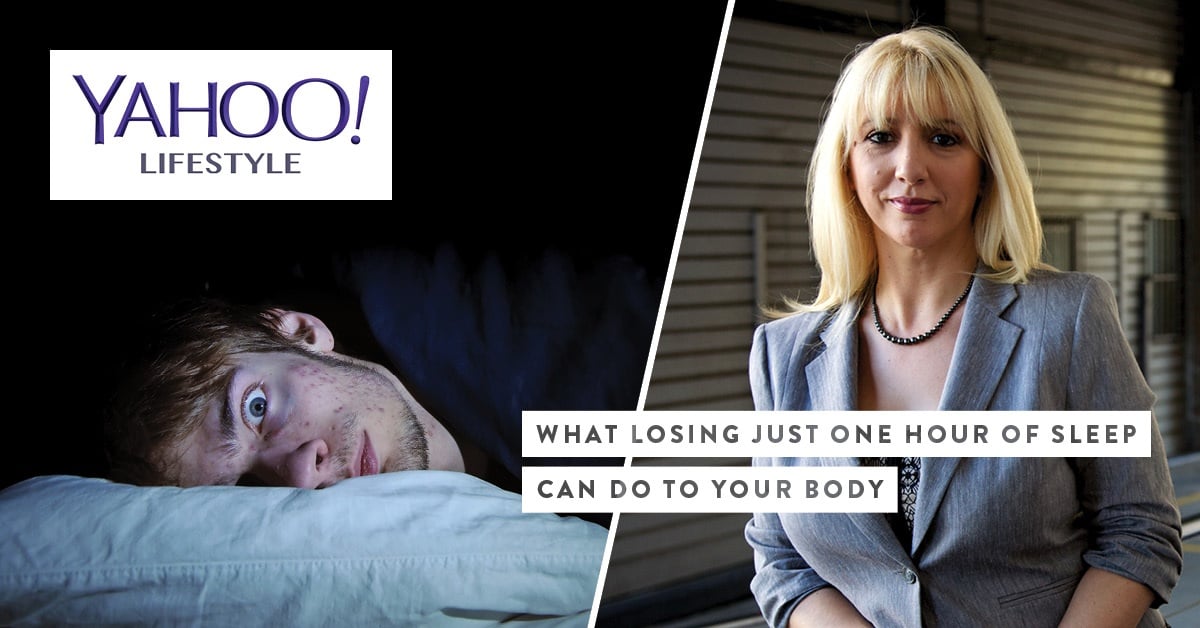How Energy & Vitality Enhance Your Performance
Energy and vitality are often used as buzzwords around an office, but why are they especially important for leadership? Ask yourself, do people want to follow someone who is exhausted all the time? The answer is probably no, and exhaustion and fatigue in leaders generally affect everyone else in the work environment--and not in a good way.
Measuring Vitality and Energy--How Do You Measure Up?
If you really think about the amount of energy you have available each day, do you think you’d be at 100%? Or, would you be on the opposite end, basically dragging yourself out of bed? Or, maybe you’re in the middle, getting things done but wondering how you could have more energy during the day.
According to science, energy is the ability to do work, and vitality refers to the state of being strong and active. However, some people start the day without feeling strong and ready to work. They feel fatigued, but they force themselves to continue until they crash. Then, they are burned out and ready to quit.
It’s as if someone was trying to take a long road trip without ever stopping to refuel or recharge the car. It simply doesn’t work. We need to stop and take care of the car to continue the journey. As much as many people don’t want to hear it, we must stop and take care of our bodies and minds.
It has become the norm to push ourselves to continue to work. We push past the warnings from our body and brain and, instead, try to accomplish one more thing. Unfortunately, things don’t seem to have improved lately--even with the work-from-home trend pushed forward by the Coronavirus.
A survey from 2020 found that of those who had transitioned from the office to the home, 55% were working extra on the weekend to keep up with their required workload. 34% of respondents said they regularly worked more than 8 hours a day.[1]
In Japan, there is even a word, ‘karoshi’, which means ‘death from overworking’. As leaders, we must encourage our employees to find a balance between work and living life. We cannot enhance our performance if we are always tired and stressed out. Our brain and body will eventually fail, leaving us without some of our most valuable resources.
Syncing Up for an Integrated Brain
If we neglect ourselves to work more, our thinking and actions may be out of sync, and it might take us longer to react or find solutions to a problem. The idea of mental vitality, beyond physical vitality, has been linked to cardiovascular health. In one research study, people who scored higher on the Mental Vitality Scale were less likely to be stricken with cardiovascular conditions, highlighting the importance of having both physical and mental vitality.[2]
We now have technology that can accurately assess how integrated our minds and bodies are. Neurofeedback training may soon become a regular part of your routine check-up, which now typically focuses on physical health. Stimulating your brain can help revive your energy and vitality to increase your overall performance as a neuroleader.
Learning how the brain functions when we operate in a leadership capacity can help us optimise our actions. EEG (electroencephalography) technology can help us understand what may be going on in terms of our brain waves and emotional state.
Combining good physical health with good management of our brain health will ensure proper integration to support performance. Research has shown how the brains of high-performing individuals are more integrated compared to their average-performing peers.[3]
Stress is Becoming the Norm, Unfortunately
Workers today are more productive than ever, so we know people are working harder. According to the Economic Policy Institute, productivity has increased 61.8% from 1979 to 2020.[4] Workers are expected to do more with less while not taking proper lunch breaks, getting enough sleep or having time to exercise or just relax.
Living like this can drain our most precious asset--our energy. At some point, we have to face reality and the consequences of living this way. While our work is important, it should not overshadow other aspects of being a human- companionship, time to relax, time to create art and music, and just living and enjoying life.
In the short term, we may become moody, grumpy and snap at people around us. This behaviour can drastically impact our relationships with others, both at work and at home. Our social lives may also suffer because who wants to be around someone who is always short-tempered?
People may ‘fake it til they make it’ at work, but then they go off on their partners, children and pets at home. They cannot keep up the act in their personal lives, and the people they value the most (friends and family) are hurt.
Long-term consequences are even more profound because, at some point, our physical and mental health will be affected. Continually pushing yourself without understanding how energy is generated can lead to disease.
What is the Solution?
If this sounds like your life, it is time to stop. Take a break, sit comfortably and focus on yourself in a practice called interoception.[5] This means you notice your physical body and feel your emotions. Listen to your heart beating and focus on the rhythm of your breath.
Many people find it easy to practise this with their eyes closed, minimising distractions. Our brain and major organs are constantly relaying information back and forth, and when we stop and listen to our bodies, we can start to understand how we are truly feeling.
Stop for a moment and breathe. Follow the exercise above, and try to listen to your body and mind. Then ask yourself…how do I feel at this moment in time?
If you aren’t sure how to answer that question, you probably need some practice. Doing exercises like interoception will make you more aware of what is going on within. Then, you can set up strategies to help regain your energy when you notice yourself becoming fatigued.[6]
In recent years, neuroscientists have realised that a critical function of interoception is to signal the body’s energy status, which can help us develop the behaviours we need to renew our energy resources.
For example, if a meeting is particularly tense, and we recognise the tension in ourselves, we could go for a walk to reset our brains. Once we are relaxed, we will be better able to face the next tasks we need to accomplish. Otherwise, we will carry that tension with us throughout the day until it becomes overwhelming.
When you take the time to cleanse your physical body of accumulated stress and toxicity, you are rewarded with increased vitality and optimal health.
Debbie Ford
Tips to Increase Energy and Vitality
From a leadership perspective, most people want to follow leaders who are energetic, dynamic and full of vitality. People will not be inspired or enthusiastic about working for leaders who are always tired, in a bad mood or apathetic.
Once we learn how to assess our energy levels, what can we do to maintain them? Consider these ideas to help increase your vitality and energy.[7]
- Moving your body. Regular exercise boosts our energy in many ways. Try walking on breaks or walking to speak with someone in the office instead of calling. Stretching, yoga, and weight training are excellent options to help increase energy.
- Avoid too much caffeine or alcohol and drink enough water. While a morning cup of coffee might be part of your routine, an afternoon cup of coffee or a can of soda often have unintended consequences. Instead, drink water, stand up, stretch, and move around to help face the afternoon slump.
- Regulate your emotions. Some people naturally wear their emotions on their sleeves, while others are more stoic. Either way, we want to regulate our emotions positively to avoid stress building up to toxic levels. Yoga, time with friends, therapy, and hobbies can help us feel more balanced.
- Set the proper sleep environment. Establish a sleep routine and stick to it, even on vacations and weekends. Cooler temperatures, turning off electronics and relaxing may lead to more restful sleep. Good sleep is crucial for our energy levels, and too little sleep is terrible for the body and mind.
We must take care of ourselves because if we do not, who will? The sooner we establish healthy habits, the better we look and feel. Having an abundance of energy is possible, but only with significant lifestyle changes. Aren’t you ready to feel more energetic at work and home?
Citations:
- Pelc C. Overwork: Impact on health and preventive solutions. 26 May 2022 [cited 18 Oct 2022]. Available: https://www.medicalnewstoday.com/articles/can-overwork-kill-you
- Richman LS, Kubzansky LD, Maselko J, Ackerson LK, Bauer M. The relationship between mental vitality and cardiovascular health. Psychol Health. 2009;24: 919–932.
- Harung HS, Travis F. Higher mind-brain development in successful leaders: testing a unified theory of performance. Cogn Process. 2012;13: 171–181.
- The Productivity–Pay Gap. In: Economic Policy Institute [Internet]. [cited 30 Jan 2022]. Available: https://www.epi.org/productivity-pay-gap/
- Furman M. Special Issue on Interoception. Trends Neurosci. 2021;44: 1–2.
- Quigley KS, Kanoski S, Grill WM, Barrett LF, Tsakiris M. Functions of Interoception: From Energy Regulation to Experience of the Self. Trends Neurosci. 2021;44: 29–38.
- 9 tips to boost your energy — naturally. In: Harvard Health [Internet]. 30 Aug 2020 [cited 30 Jan 2022]. Available: https://www.health.harvard.edu/energy-and-fatigue/9-tips-to-boost-your-energy-naturally
- i4 Neuroleader (353)
- Leadership & Culture (336)
- Brain Health & Wellbeing (206)
- Innovation (97)
- Performance (85)
- Our News (79)
- Collaboration (68)
- Agility (53)
- Practitioner Stories (44)
- In The Press (36)
- Make Me A Leader (33)
- Balance (31)
- Integration (30)
- Imagination (29)
- Awareness (23)
- Brain-Friendly Channel (22)
- Brain-Friendly Leadership (22)
- Communication (22)
- Curiosity (21)
- Inspiration (19)
- Intuition (19)
- Attitude (17)
- Courage (16)
- Adaptability (14)
- Case Studies (14)
- Drive (14)
- Generosity (13)
- Ethics (9)
- Mental Readiness (9)
- Influence (8)
- Retreat (8)
- Brain-Friendly Leadership (1)
- Oracle Cards (1)
- 1 November 2025 (2)
- 1 September 2025 (3)
- 1 August 2025 (5)
- 1 July 2025 (5)
- 1 June 2025 (2)
- 1 April 2025 (1)
- 1 March 2025 (8)
- 1 February 2025 (3)
- 1 September 2024 (4)
- 1 July 2024 (2)
- 1 June 2024 (6)
- 1 May 2024 (2)
- 1 April 2024 (3)
- 1 March 2024 (1)
- 1 November 2023 (1)
- 1 August 2023 (1)
- 1 July 2023 (2)
- 1 June 2023 (2)
- 1 May 2023 (4)
- 1 April 2023 (2)
- 1 March 2023 (7)
- 1 February 2023 (4)
- 1 January 2023 (1)
- 1 September 2022 (1)
- 1 May 2022 (3)
- 1 April 2022 (1)
- 1 March 2022 (5)
- 1 February 2022 (4)
- 1 January 2022 (4)
- 1 December 2021 (2)
- 1 November 2021 (4)
- 1 October 2021 (3)
- 1 September 2021 (6)
- 1 August 2021 (1)
- 1 April 2021 (1)
- 1 December 2020 (2)
- 1 November 2020 (1)
- 1 September 2020 (1)
- 1 August 2020 (1)
- 1 July 2020 (3)
- 1 June 2020 (4)
- 1 May 2020 (3)
- 1 April 2020 (4)
- 1 March 2020 (6)
- 1 February 2020 (4)
- 1 January 2020 (2)
- 1 December 2019 (3)
- 1 November 2019 (3)
- 1 October 2019 (5)
- 1 September 2019 (4)
- 1 August 2019 (4)
- 1 July 2019 (4)
- 1 June 2019 (5)
- 1 May 2019 (9)
- 1 April 2019 (9)
- 1 March 2019 (8)
- 1 February 2019 (7)
- 1 January 2019 (8)
- 1 December 2018 (5)
- 1 November 2018 (10)
- 1 October 2018 (16)
- 1 September 2018 (9)
- 1 August 2018 (10)
- 1 July 2018 (9)
- 1 June 2018 (8)
- 1 May 2018 (9)
- 1 April 2018 (9)
- 1 March 2018 (9)
- 1 February 2018 (8)
- 1 January 2018 (8)
- 1 December 2017 (6)
- 1 November 2017 (9)
- 1 October 2017 (9)
- 1 September 2017 (8)
- 1 August 2017 (10)
- 1 July 2017 (8)
- 1 June 2017 (8)
- 1 May 2017 (9)
- 1 April 2017 (8)
- 1 March 2017 (6)
- 1 January 2017 (3)
- 1 December 2016 (4)
- 1 November 2016 (5)
- 1 October 2016 (4)
- 1 September 2016 (2)
- 1 August 2016 (4)
- 1 July 2016 (4)
- 1 June 2016 (2)
- 1 May 2016 (3)
- 1 April 2016 (3)
- 1 March 2016 (7)
- 1 February 2016 (2)
- 1 January 2016 (5)
- 1 December 2015 (2)
- 1 November 2015 (2)
- 1 October 2015 (4)
- 1 September 2015 (2)
- 1 August 2015 (2)
- 1 July 2015 (1)
- 1 June 2015 (3)
- 1 May 2015 (4)
- 1 April 2015 (5)
- 1 March 2015 (3)
- 1 February 2015 (3)
- 1 January 2015 (3)
- 1 December 2014 (3)
- 1 November 2014 (3)
- 1 October 2014 (3)
- 1 September 2014 (5)
- 1 August 2014 (4)
- 1 July 2014 (5)
- 1 June 2014 (3)
- 1 May 2014 (1)
- 1 March 2014 (1)
- 1 December 2013 (2)
- 1 November 2013 (1)
- 1 July 2013 (1)
- 1 June 2013 (1)
- 1 May 2013 (3)
- 1 April 2013 (1)
- 1 March 2013 (2)
- 1 February 2013 (1)
- 1 January 2013 (2)
- 1 November 2012 (1)
- 1 October 2012 (1)
- 1 September 2012 (1)
- 1 August 2012 (2)
- 1 July 2012 (1)
- 1 June 2012 (1)
- 1 May 2012 (2)
- 1 April 2012 (1)
- 1 February 2012 (1)
- 1 January 2012 (1)
- 1 November 2011 (1)
- 1 October 2011 (3)
- 1 September 2011 (2)
- 1 July 2011 (1)
- 1 June 2011 (1)
- 1 May 2011 (1)
- 1 April 2011 (1)
- 1 March 2011 (1)
- 1 February 2011 (2)
- 1 January 2011 (4)
- 1 December 2010 (4)
- 1 November 2010 (3)
- 1 October 2010 (5)
- 1 September 2010 (4)
- 1 August 2010 (4)
- 1 July 2010 (3)
- 1 June 2010 (4)
- 1 May 2010 (7)
- 1 April 2010 (5)
Subscribe by email
You May Also Like
These Related Stories

Biohacking Your Body for Better Sleep

Yahoo Lifestyle: What Losing Just ONE Hour Of Sleep Can Do To Your Body



No Comments Yet
Let us know what you think